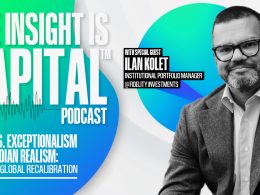by Brian S. Wesbury – Chief Economist & Robert Stein, CFA – Deputy Chief Economist, First Trust Portolios
At the last meeting two weeks ago, Chairman Jerome Powell got the Federal Reserve to stand pat on interest rates, but not without a struggle.
Two Fed governors, Christopher Waller and Michelle Bowman, dissented from the decision not to change rates and openly preferred cutting the target for short-term rates instead, the first time we’ve had two governors dissent since 1993. But, in the current political context, with Powell’s term of chairman running out next year, these dissents may be more than normal dissents. They are clearly a way to campaign to be the new chairman. In that vein, Bowman is going farther and publicly saying she wants three cuts!
And now, due to the early resignation of Fed Governor Adriana Kugler, a Biden appointee, Trump has a chance to add to the two dissents by nominating the current Chairman of his Council of Economic Advisers, Stephen Miran, to the Fed as well. It is almost certain that Miran, once confirmed, would vote to cut rates if he joins the Fed by the meeting in mid-September.
Powell has been holding out against rate cuts, claiming that uncertainty surrounding the potentially inflationary effects of tariffs requires caution in cutting rates, which is odd considering that Powell was fully willing to monetize extra government spending during COVID, and we do not recall him ever making an argument that increases in income tax rates or the corporate profits tax would require higher interest rates (or slower rate cuts).
In turn, the Trump Administration has suggested that the search for a successor to Powell has widened recently, to include not only former Fed Governor Kevin Warsh and Trump advisor Kevin Hassett (“the Kevins”), but also the recent dissenting governors, former Bush aide Marc Sumerlin, and former St. Louis Fed Bank President James Bullard.
Round and round the decision goes, who Trump picks no one knows.
One reason for all the drama is simple: the president loves drama, and if you get elected president and like drama, then you’re allowed to generate drama. Politics 101.
A second reason is that the president wants to play many candidates against each other so he can get the best deal from the one he picks, the one most likely to be more open to cuts in short-term rates, but who would also maintain the confidence of the markets that inflation would remain contained.
But we believe there may also be a third reason, which is that the president could be looking for a Fed chief who will reverse the disastrous decision originally made by Ben Bernanke (supported by the votes of Warsh and Bullard) almost two decades ago.
That decision was to abandon the system of implementing monetary policy by managing the scarcity of reserves in the banking system, which resulted in market shifts in short-term interest rates, and instead launching quantitative easing, leading to (over-) abundant bank reserves, and then directly controlling short-term rates by paying banks interest on reserves, a system that’s led to the Fed itself running massive operating deficits.
Think about it. For better or for worse, no president in our lifetimes been more willing to use his political capital to review and change the way Washington works. USAID, the Department of Education, the Census Bureau, colleges that rely on federal largesse have never seen such rapid-fire changes. We would not be surprised if the Fed is next.
Brian S. Wesbury – Chief Economist
Robert Stein, CFA – Deputy Chief Economist
Click here for a PDF version
Copyright © First Trust Portolios














